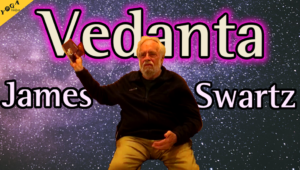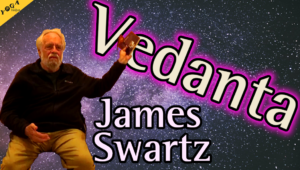The supreme person. Experiencing or being the self? Two orders of reality. You are never  not experiencing yourself. Duality and Non-duality are not opposites. You can be and experience yourself at the same time. It is not necessary to get rid of the ego to become the self. Parinama, substance, name and form. Not two. The self is no object but it is always present and always experienced. Unfortunately it is not always known. Claiming the self as your primary identity. Your identy as a person doesn’t go away. Dvaita bhakti is an intelligent use of my free will. Samsara problem is: transacting with something other than you. Vedanta solves the problem of experience and knowledge. The knowledge gives you the permanent appreciation of your self as love. There is only one love. A non-dual bhakta is still a person. Just being and knowing your are the self doesn’t change the life as a person. If you want to create something in the mithya dimension you have to do the work there. Non-dual love is understanding that satya and mithya are in different dimensions. Superimposing the perfection of the self onto the jiva. But the jiva never becomes perfect. There is no connection between the self and the world. You know you are free as the self although duality is happening in you. Verse 23: You look at people in terms of what they can do for you. Selfish relationships develop. The heart that gives gathers. The needs of the Lord come first. He who eats the remnants of the sacrifice incurs no skin. The joy of offering your self as a service. The joy of doing the right thing is more important than getting any object. Course in miracles and Vedanta. Rama is taking his joy from following dharma, doing the right thing. By acting with selfishness you inhibit your growth.
not experiencing yourself. Duality and Non-duality are not opposites. You can be and experience yourself at the same time. It is not necessary to get rid of the ego to become the self. Parinama, substance, name and form. Not two. The self is no object but it is always present and always experienced. Unfortunately it is not always known. Claiming the self as your primary identity. Your identy as a person doesn’t go away. Dvaita bhakti is an intelligent use of my free will. Samsara problem is: transacting with something other than you. Vedanta solves the problem of experience and knowledge. The knowledge gives you the permanent appreciation of your self as love. There is only one love. A non-dual bhakta is still a person. Just being and knowing your are the self doesn’t change the life as a person. If you want to create something in the mithya dimension you have to do the work there. Non-dual love is understanding that satya and mithya are in different dimensions. Superimposing the perfection of the self onto the jiva. But the jiva never becomes perfect. There is no connection between the self and the world. You know you are free as the self although duality is happening in you. Verse 23: You look at people in terms of what they can do for you. Selfish relationships develop. The heart that gives gathers. The needs of the Lord come first. He who eats the remnants of the sacrifice incurs no skin. The joy of offering your self as a service. The joy of doing the right thing is more important than getting any object. Course in miracles and Vedanta. Rama is taking his joy from following dharma, doing the right thing. By acting with selfishness you inhibit your growth.
More Vedanta Seminars:
https://www.yoga-vidya.de/seminare/interessengebiet/vedanta/
More on Vedanta:
https://wiki.yoga-vidya.de/Vedanta
English Community, Blog, Seminars:
https://www.yoga-vidya.org/english/seminar/
Podcast: Play in new window | Download
Subscribe: RSS



